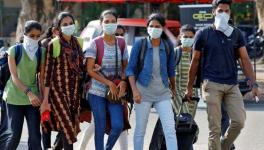Explainer: New Delta Plus Variant of SARS-CoV-2 and Causes of Concern
A new mutant variant of the SARS-CoV-2 virus, named Delta plus or AY.1, has been identified, which has been found to have emerged the Delta variant that first surfaced in India.
According to Vinod Scaria, a scientist at the Institute of Genomics and Integrative Biology (IGIB), Delhi, the Delta plus variant is characterised by the acquisition of mutation in its spike protein, the protein which helps the virus to stick to human cells and infect them. The mutation in the spike protein is K417N which was also found in the Delta variant.
Public Health England (PHE) has said that so far, 63 genomes across the world have been found to have the Delta and K417N mutation, as per GISAID, the database where genome sequences of the novel coronavirus from across the world are stored. PHE also reported having said that as of June 7, India has six such cases where the new variant has been found.
On June 13, Scaria wrote on Twitter that, “The variant frequency for K417N is not much in India at this point. The sequences are mostly from Europe, Asia, and America.”
As per records, the earliest genome sequence of SARS-CoV-2 bearing the mutation of the new variant was found in Europe somewhere in the last part of March this year.
The good part though is that till now, India has a low incidence of the new variant. Travel histories for the new variant are not widely available so that any assumptions cannot be made about the variant right away. However, one cause of concern about the variant, especially in the context of India, could be that evidence suggests that the variant is resistant to monoclonal antibodies.
A monoclonal cocktail—Casirivimab and Imdevimab has received emergency use authorisation in India from the central drugs standard control organisation (CDSCO). However, Roche India and Cipla have put a steep price on the monoclonal antibody combo. According to NDTV, the price stands at Rs 59,750 per dose.
Also read: COVID-19: Can Mixing of Different Vaccines Boost Immune Responses?
Monoclonal antibodies are artificially produced antibodies in a lab and tailored in a fashion that they become highly effective against the disease these antibodies are prepared for. Antibodies are protein molecules that the defence mechanism (immune system) of our body produces to fight infection.
Casirivimab and Imdevimab are the monoclonal antibodies that are specifically manufactured against the spike protein of SARS-CoV-2. These antibodies are designed in a way that they can block the attachment of the virus to human cells (which is done with the help of the spike protein) and prevent the virus to enter the cells.
However, resistance to the commercial monoclonal antibody by the newly emerged variant does not directly suggest that it is associated with higher virulence or can cause more severity in the disease.
Immunologist Vineeta Bal, a guest faculty at the IISER, Pune, was quoted to have said, “How transmissible this new variant is will be a crucial factor to determine its rapid spread or otherwise.” Bal also pointed out that the quality and quantity of neutralising antibodies generated in an infected person are not very likely to get affected because of the new mutation.
She also said that infections with this new variant may not be worth worrying about at this moment.
Similarly, Anurag Agarwal, the director of IGIB, also said that there is no cause of concern in India as of now. He pointed out that the blood plasma of people who are fully vaccinated will have to be collected and then tested against the new variant to understand whether the new variant is capable of any significant immune evasion.
Get the latest reports & analysis with people's perspective on Protests, movements & deep analytical videos, discussions of the current affairs in your Telegram app. Subscribe to NewsClick's Telegram channel & get Real-Time updates on stories, as they get published on our website.



















